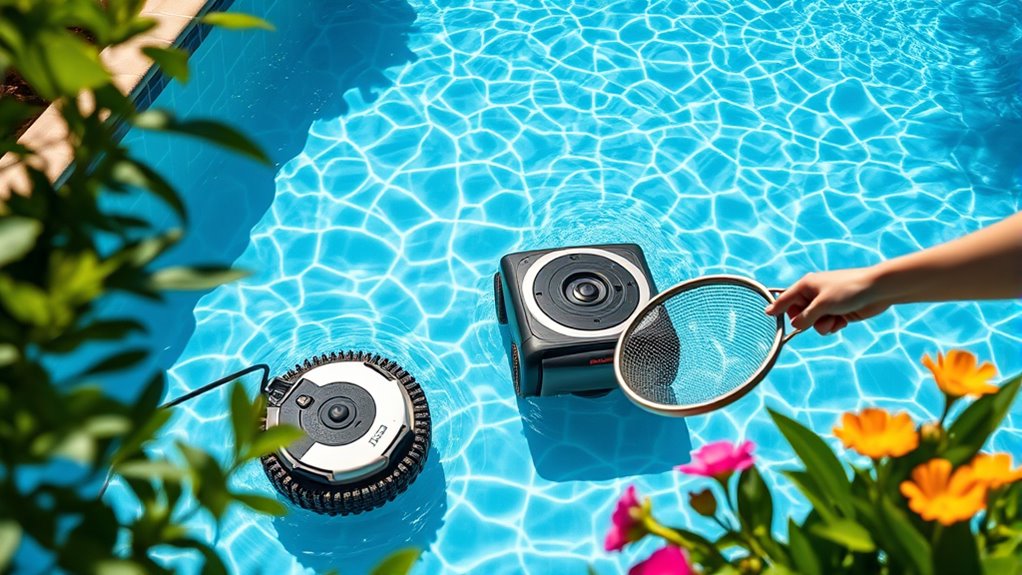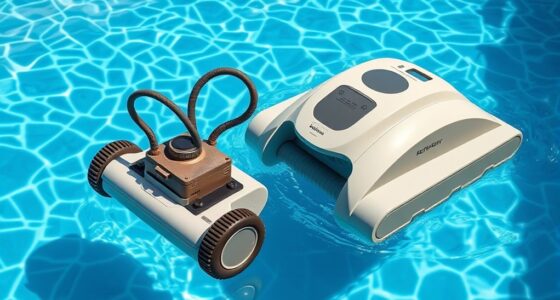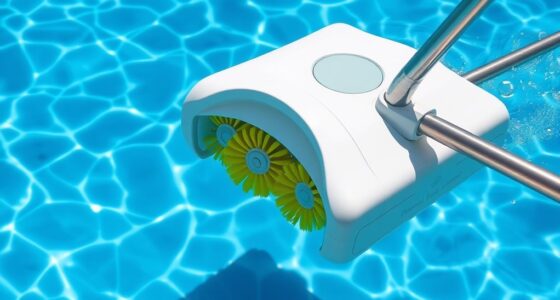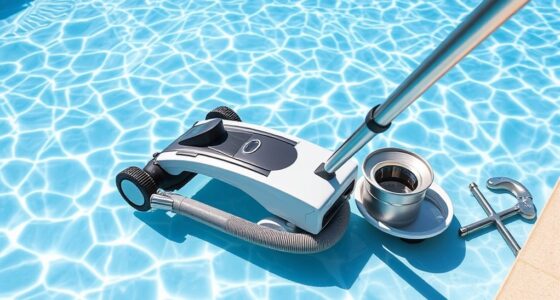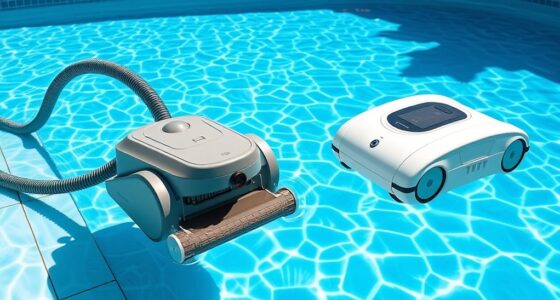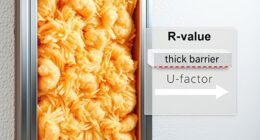To create the ultimate pool cleaning schedule, balance automatic tools like robotic vacuums and skimmers with manual chores such as brushing walls and fixing water chemistry. Regularly inspect equipment, perform routine filter cleans, and test water chemistry at least twice weekly. Setting specific days for each task keeps your pool clear, safe, and inviting. Staying consistent with this routine helps catch issues early and maintain a pristine pool—more tips for a perfect schedule are just ahead.
Key Takeaways
- Schedule regular water testing (e.g., Mondays and Thursdays) to maintain chemical balance and prevent algae growth.
- Use automatic cleaners like robotic vacuums weekly and supplement with manual brushing for detailed wall and floor cleaning.
- Inspect and clean filters, skimmer baskets, and pumps monthly to ensure optimal equipment performance.
- Allocate specific days for manual skimming and debris removal, ideally midweek, to keep surface debris at bay.
- Combine automatic and manual methods consistently to achieve thorough cleaning and extend pool equipment lifespan.
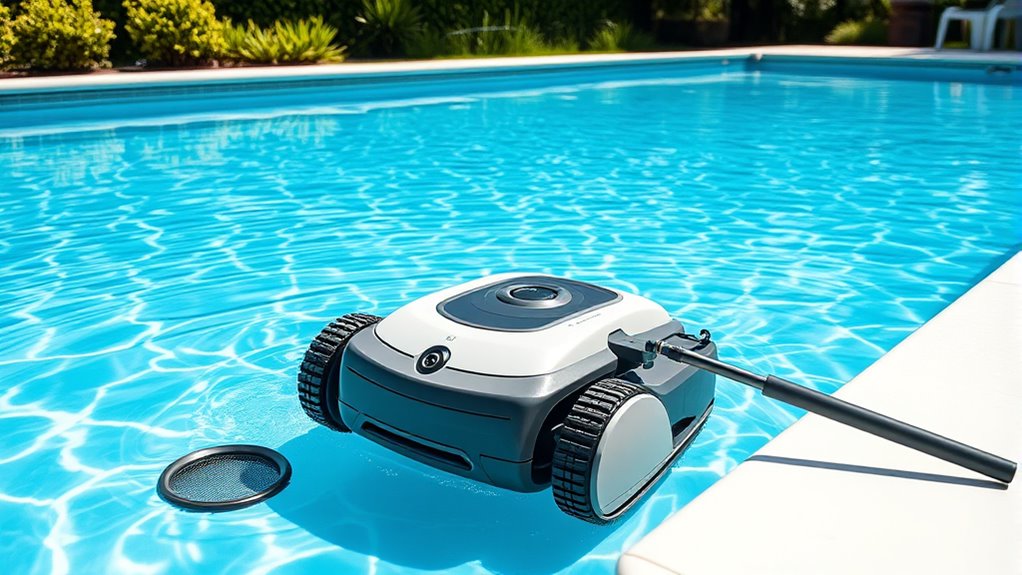
Maintaining a clean pool requires a well-planned cleaning schedule that keeps the water clear and safe for swimming. To achieve this, you need to stay on top of maintaining the chemical balance and regularly inspecting your equipment. Proper chemical balance ensures your pool water isn’t too acidic or alkaline, which can cause irritations or damage your pool surfaces. Testing your water at least twice a week allows you to adjust chlorine, pH, alkalinity, and other chemical levels promptly, preventing algae growth and bacterial buildup. When your chemicals are balanced, your pool stays healthier, clearer, and safer for swimmers.
Regular chemical testing keeps your pool safe, clear, and inviting for every swimmer.
Equipment maintenance is equally essential. Regularly inspecting your pool’s filtration system, skimmers, and pumps keeps everything running smoothly. Clean your filter at least once a month or more often if your pool sees heavy use or debris. A well-maintained filtration system ensures proper circulation, which is vital for distributing chemicals evenly and removing contaminants. Don’t forget to check the skimmer baskets and pump strainer regularly, removing leaves, bugs, and debris that can clog your system. Well-maintained equipment reduces the risk of breakdowns, extends the life of your pool components, and keeps your water sparkling clean. Additionally, understanding the importance of regular maintenance can help prevent costly repairs and extend the lifespan of your pool. Incorporating appropriate cleaning tools can also enhance the effectiveness of your routine cleaning practices. Maintaining a comprehensive pool cleaning schedule is crucial for consistent results and long-term savings. Regular equipment upgrades can further improve your pool’s efficiency and longevity, especially for older systems.
Automatic cleaning devices like robotic vacuums and pool skimmers can reduce manual labor, but they shouldn’t replace your routine manual cleaning entirely. Set a weekly schedule for brushing the pool walls and floor to dislodge algae and dirt that automatic cleaners might miss. Manual skimming of the water surface helps remove floating debris before it sinks and causes staining or clogging. Combining automatic and manual cleaning methods creates a thorough routine that keeps your pool pristine with less effort.
Consistency is key to a successful pool cleaning schedule. Allocate specific days for chemical testing, equipment checks, and manual cleaning tasks. For example, you might test water chemistry on Mondays and Thursdays, perform equipment maintenance on weekends, and do manual cleaning on Wednesdays. This routine ensures you catch problems early—like imbalanced chemicals or clogged filters—before they escalate into costly repairs or health hazards. Regular pool maintenance and discipline will help ensure your pool remains inviting and safe for every swim, whether it’s a quick dip or a long weekend gathering.
Frequently Asked Questions
How Often Should I Replace My Pool’S Automatic Cleaner Parts?
You should replace your pool cleaner parts when they start showing signs of wear or decreased performance, typically every 1 to 3 years. Regularly check for issues to maintain proper pool chemical balance and guarantee seasonal maintenance is up to date. Prompt replacements keep your cleaner running efficiently, preventing debris buildup and protecting your pool’s overall health. Staying on top of these parts helps you enjoy a clean, safe swimming environment year-round.
What Are Signs My Manual Skimmer Needs Repair?
If your manual skimmer isn’t working properly, look for repair indicators like a jammed or overflowing skimmer basket, or if it’s not removing debris efficiently. You might notice water bypassing the skimmer or persistent clogs. These signs suggest you need to inspect and possibly repair or substitute parts. Keeping an eye on these indicators helps ensure your skimmer functions well and keeps your pool clean.
Can Automatic Cleaners Handle Algae Removal Effectively?
Think of automatic cleaners like robotic maintenance workers—they’re great at keeping the pool surface tidy but might struggle with stubborn algae. While they can handle light algae prevention, heavy algae blooms often require manual brushing and chemical treatment. Relying solely on automatic cleaners isn’t enough; combining manual cleaning with your robot guarantees thorough algae removal, keeping your pool crystal clear and inviting.
How Do Weather Changes Affect My Cleaning Schedule?
Weather changes, like seasonal maintenance and temperature fluctuations, directly impact your cleaning schedule. You might need to clean more often during hot, sunny periods when algae grow faster, and reduce cleaning during cooler months. Temperature fluctuations can also affect chemical balance, so stay vigilant. Adjust your routine accordingly, using automatic cleaners to handle routine tasks and manual cleaning for detailed care, ensuring your pool stays pristine year-round.
Is It Necessary to Shock the Pool Regularly?
You should shock your pool regularly to maintain proper chemical balance and keep water clean. Shocking helps eliminate contaminants and algae, especially after heavy use or storms. Use water testing frequently to monitor chlorine levels and pH, then shock when levels are off. Regular shocking guarantees your pool stays safe, clear, and inviting, reducing the risk of bacteria and algae buildup that can compromise water quality.
Conclusion
By following this balanced pool cleaning schedule, you’ll keep your pool sparkling year-round. Did you know that regular maintenance can reduce algae growth by up to 80%? Combining automatic cleaners with manual checks guarantees your water stays clean, clear, and inviting. Stick to this routine, and you’ll enjoy hassle-free swimming and less costly repairs down the line. Keep your pool in top shape, and you’ll look forward to every swim season with confidence.
